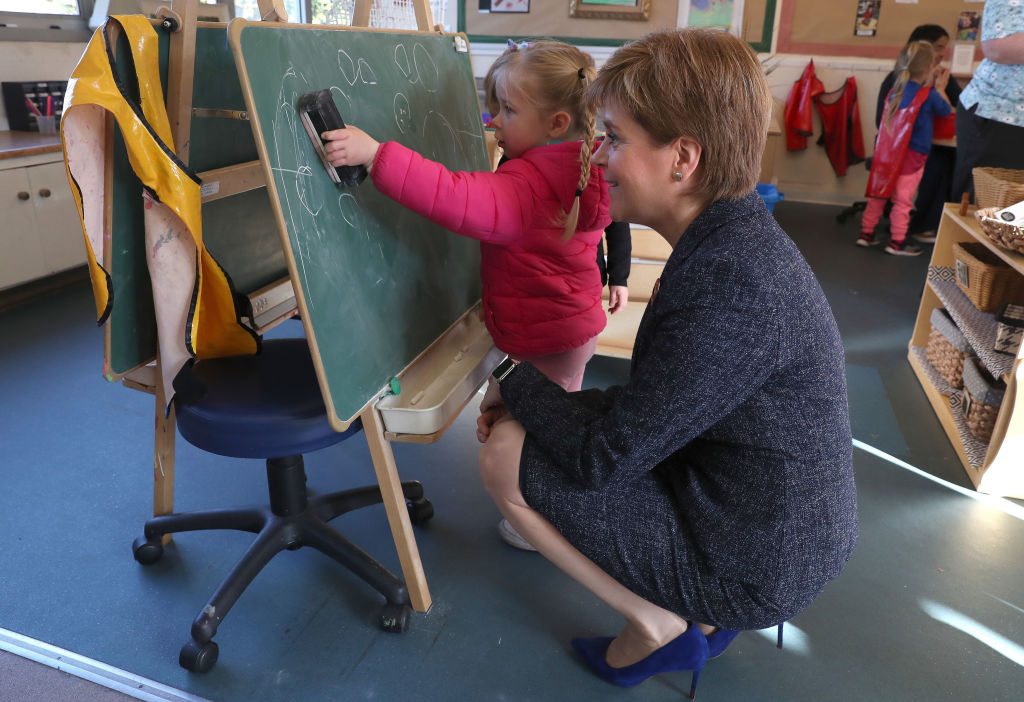For anyone who assumes the SNP government’s secrecy and obstruction is limited to inquiries into itself and its past leaders, the fate of a major report into Scottish education is an instructive tale.
Curriculum for Excellence (CfE), introduced in 2010, was the SNP’s grand idea for better learning in Scottish schools. Its ‘progressive’, ‘child-centred’ philosophy was contentious among teachers but was eagerly bought into by educationalists, educrats and teachers’ unions. Dissenters were generally caricatured as stuffy old reactionaries who wanted children bolted down in rows, facing a blackboard, as an authoritarian dominie catechised them in the rote memorising of formulae, dates and rules.
Needless to say, the caricatures turned out to have a point. Scottish pupils perform worse in maths than pupils in Czechia, Estonia and Slovenia. In 2019, almost 40 per cent of those from the poorest backgrounds left primary school without meeting basic literacy benchmarks and almost one-third failed to achieve the same in mathematics. Research has recorded a ‘sharp reduction’ in subject choice and schools allowing pupils to sit more than six exams at National 4 or 5 level are now a minority in Scotland.
Dr Stephen Curran, who previously advised the UK Government on the national maths curriculum, has described CfE as ‘vague’, ‘lacking in clarity’, ‘wishy-washy’ and says it is creating a ‘crisis’ in Scottish education. Edinburgh University’s Professor Lindsay Paterson contends that ‘a whole generation will have been betrayed’ by the time the political, educational and academic class wake up to the inadequacy of CfE and the constructivist dogma upon which it is based.
After years of denying the problem, SNP education minister John Swinney ordered a review last year. The SNP likes reviews because announcing one sounds deceptively like doing something rather than doing nothing more expensively. This is the way of government-by-press-release: their target is deadlines, their benchmark headlines. The only surprise was that Swinney commissioned the OECD to conduct this review, given his government’s decidedly cool attitude towards external analysis of its performance. The Nationalists have withdrawn Scotland from two of the three main international educational attainment studies and Swinney reportedly questioned the necessity of the third.
The downside of reviews is that they don’t always come to the right conclusions and if they met news deadlines, they would bring the wrong headlines. There is a strong indication that this could be the case with the OECD report. The Times reveals that the report, due to be published this month, will now be held back until June, which is, coincidentally, the month after May, and, even more coincidentally, the month after the Scottish Parliament elections. Ministers already have a draft and, the newspaper relays, are ‘blaming the pandemic for the delay’ in publication. Covid-19 has forced many people to quarantine but this must be the first government report required to self-isolate.
The EIS teaching union, one of the firmest fixtures in the Scottish establishment, offered the Times a tepid statement: ‘We would be keen to see the report published as soon as possible because, before, during or after the election, there will need to be a big discussion about rebooting education in the context of recovery from the pandemic.’
It has been left instead to the Scottish Lib Dems to kick up a fuss, something which they have been doing on the declining standards in Scottish schools for more than a decade now. (Their polling numbers confirm the adage that no good deed goes unpunished.) Their education spokeswoman Beatrice Wishart, a plainspoken Shetlander, accuses the Nationalists of ‘trying to stitch this up’ and aims to haul Swinney before the education committee. Given the committee is chaired by an SNP MSP, it’s unlikely to give Swinney much trouble even if it does call him in.
One of the chief flaws of devolution is that it was designed with Labour dominance in mind and unprepared for an SNP takeover. That takeover has seen the Nationalists exploit the apparatus of devolution to advance its separatist constitutional agenda, but it has also brought a groaning inertia to those areas of public policy that devolution was set up to manage. Where there has been reform, it has seldom disrupted the professional preferences or institutional conservatism of Scotland’s provider class. Where that reform has demonstrably failed, the Scottish Government and its satellite sympathisers in civil society dodge, deny and decry in response.
Government is a matter of priorities and, while Nicola Sturgeon claims education is her ‘number one priority’, in truth her government has only one: the political interests of the SNP.







Comments